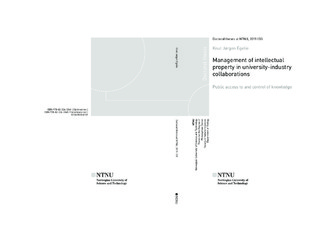Management of intellectual property in university-industry collaborations – public access to and control of knowledge
Doctoral thesis
Permanent lenke
http://hdl.handle.net/11250/2601582Utgivelsesdato
2019Metadata
Vis full innførselSamlinger
- Institutt for biologi [2616]
Sammendrag
The transfer of knowledge from academic institutions to society takes a number of forms. The classic form is the dissemination of research results through journals and the education of skilled people, who then provide this knowledge outside the academic learning and study environment. A new social contract is now being developed between academia and governments. This contract makes funding available to academia in exchange for more specific participation in the development of the economy. Universities provide society with access to knowledge, to promote economic progress through intellectual property rights (IPRs). This is achieved through collaborations with industry parties and other organisations. Industry usually has a closer relationship with the market and with the public need for new products and services. Industry is, rather than pursuing their own research and development, therefore turning increasingly to existing knowledge providers to accelerate access to innovations and to save R&D costs. The question of who is entitled to use this knowledge and for what purposes becomes a question of control and ownership of what some might argue is a public good. The management of university-based intellectual property becomes a central element in the control of and achieving balance in the sharing of societal and economic goods at both the individual, organizational and institutional level. This thesis builds on prior knowledge of how universities are managing intellectual property (IP) in making new research available to other parties. Biotechnology research in particular has been investigated. Biotechnology research can spawn broadly useful technology research platforms such as the editing platform CRISPR/Cas9, which has frequently been criticised as a knowledge monopoly. The access to such technology can be restricted, and utilisation of research results depends on the contractual provisions devised by the owners of the technology. It is therefore imperative to better understand the conditions under which knowledge monopolies are likely to emerge. How IP is strategically used by universities in relation to the degree of public funding of research collaborations and the access to research platforms has not previously been available in prior research studies and is at the core of this thesis.
Består av
Paper 1: Egelie, Knut Jørgen; Graff, Gregory; Strand, Sabina P.; Johansen, Berit. The emerging patent landscape of CRISPR-Cas gene editing technology: Early views on control and access for follow-on commercial applications. Nature Biotechnology 2016 ;Volum 34.(10) s. 1025-1031 - Is not included due to copyright available at https://doi.org/10.1038/nbt.3692Paper 2: Egelie, Knut Jørgen; Johansen, Berit; Strand, Sabina P.; Myskja, Bjørn Kåre. The ethics of access to patented biotech research tools from universities and other research institutions. Nature Biotechnology 2018 ;Volum 36.(6) s. 495-499 Is not included due to copyright available at https://doi.org/10.1038/nbt.4165
Paper 3: Egelie, Knut Jørgen; Lie, Haakon Thue; Sørheim, Roger; Grimpe, Christoph. PUBLIC FUNDING OF COLLABORATIVE RESEARCH AND THE ACCESS TO RESEARCH RESULTS
Paper 4: EGELIE, K. J., GRIMPE, C., SØRHEIM, R., THUE LIE, H., 2019. Biotechnology research collaborations between universities and industry create knowledge monopolies–an empirical study of access and openness - This paper is now accepted and published in Nature Biotechnology volume 37, pages1413–1419(2019) available at https://doi.org/10.1038/s41587-019-0324-7
